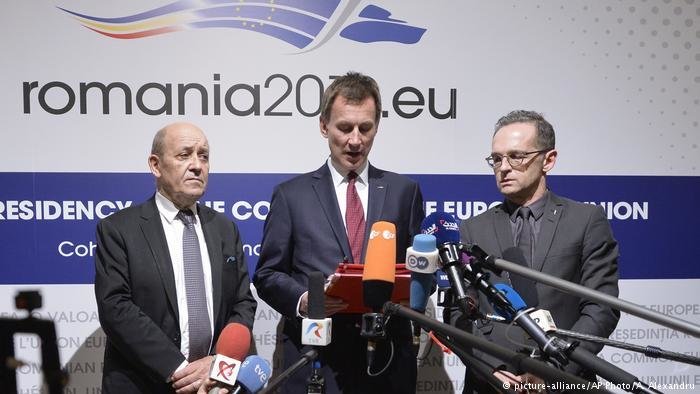SPV: A European mechanism to struggle U.S., gain economic autonomy

In their joint statement on that last day of January, French Foreign Minister Jean-Yves Le Drian, German Foreign Minister Heiko Maas, and British Foreign Secretary Jeremy Hunt introduced the SPV (a special purpose vehicle) also called INSTEX (Instrument in Support of Trade Exchanges), the financial mechanism which enables Iran to keep doing business with the rest of the world despite the draconian financial sanctions imposed by the Trump administration.
The instrument, created due to Iran’s full compliance with the Joint Comprehensive Plan of Action (JCPOA), is aimed at facilitating legitimate trade between European economic operators and Iran and making exchange of goods between Iranian companies and foreign ones by circumventing the American banking system and currency.
Financed jointly by the E3, registered in France and run by a German banker, the INSTEX is in accordance with E3 resolute commitment and continued efforts to preserve the JCPOA endorsed by United Nations Security Council resolution 2231.
According to the published statement of the E3 foreign ministers, INSTEX aims in the long term to be open to economic operators from third countries who wish to trade with Iran and the E3 continue to explore how to achieve this objective.
SPV’s operationalization follows a step-by-step approach. “The E3 together with INSTEX will continue to work on concrete and operational details to define the way the company will operate. They will also work with Iran to create an effective and transparent corresponding entity that is required to be able to operationalize INSTEX,” the released joint statement said.
“INSTEX will function under the highest international standards with regards to anti-money laundering, combating the financing of terrorism (AML/CFT) and EU and UN sanctions compliance. In this respect, the E3 expect Iran to swiftly implement all elements of its FATF action plan,” it added.
It is worth noting that, Iranian Parliament voted in favor of the CFT (the convention combatting financing of terrorism) on October 7, however, the oversight Guardian Council rejected the bill at the time. Iran’s Expediency Council is now debating the CFT and Palermo Convention as preludes to join the FATF. The issue of its rejection or ratification is presently of the most controversial ones in the country. Some express that joining the CFT will not be in the interests of the Islamic Republic, while others believe the Supreme National Security Council favors FATF. The Guardian Council should vet the bill for compliance with the Constitution.
Although it takes some months to make the SPV operational, the decision can be translated as Europeans’ effort to gain its economic sovereignty by counterweighting U.S. economic power, primacy of dollar in international financial transactions as well as the U.S. President’s unpredictability and tyrant attitude toward international agreements including the JCPOA.
The idea of setting up the INSTEX was raised on the sidelines of the UN session last September i.e. the instrument has been created almost in four months, which is rather a short period. This can prove Europeans’ full commitment to their made promises to Iran and their full support for the country’s nuclear agreement.
However, the main question would be European companies’ tendency for using the SPV and if they would feel confident to barter goods with Iran with no fear from any probable U.S. punishment.
The U.S. State Department announced on Thursday that "as the president has made clear, entities that continue to engage in sanctionable activity involving Iran risk severe consequences that could include losing access to the U.S. financial system and the ability to do business with the United States or U.S. companies."
The announcement expresses the U.S. government’s rage, as its hegemony and autocracy over the world is threatened.
For sure, the established instrument would act as a practical vehicle for small and medium-sized European enterprises with the least amount of exposure to the American-governed financial systems but it is to strengthen the international role of euro in financial transactions, and provide the Eurozone an incremental growth of economic power.
EU foreign policy chief Federica Mogherini said on Thursday that once the payment channel implemented “no danger would be posed to Iran-Europe financial mechanism.”
HJ/MA/PA
PHOTO: From left, French Foreign Minister Jean-Yves Le Drian, UK Foreign Secretary Jeremy Hunt, and German Foreign Minister Heiko Maas launch the long-awaited special vehicle for Iran trade in Bucharest, Romania, on Jan. 31. (Daniel Mihailescu/AFP/Getty Images)
